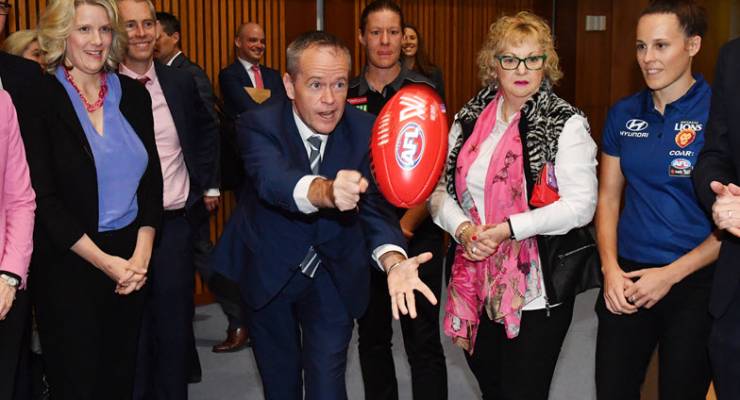
Bill Shorten at a Parliamentary Friends of Women’s AFL Morning Tea
On a cold June morning in the House of Reps courtyard, MPs and senators from Labor, the Coalition and the Greens gather. A white banner unfurls, with a logo of Parliament House and a rainbow flag adorned on top, representing the Parliamentary Friends of LGBTI Australians group. Mini quiches and sausage rolls cool next to a jug of coffee and sweet danishes. Although they are ideological opponents inside the building, Liberal MP Warren Entsch, Labor MP Graham Perrett and Greens Senator Janet Rice have nothing but kind words for each other in front of gathered staffers, journalists and guests.
Parliamentary friendship groups are a little like clubs at university, but with much less governance and structure. At the start of each parliamentary sitting, groups must apply or reapply in order to be recognised. In order to be recognised, the groups must: be apolitical, have 10 members or senators in membership, be clearly defined, be receiving no sponsorship, and have a chair and deputy chair.
Apolitical doesn’t mean that groups cannot be formed around issues that might be considered politically controversial, just that you couldn’t have a group specifically targeted against another political party, like the “No Labor Party” or the “We Hate ScoMo Group”. There are currently 65 parliamentary friendship groups across a broad range of topics from Parliamentary Friends of Surf Life Saving to Parliamentary Friends of Australian Live Music, to more controversial ones such as Parliamentary Friends for an Australian Head of State, or Parliamentary Friends of Gun Control.
From the perspective of politicians, the groups serve a couple of purposes. One MP Crikey spoke to says the groups pollies decide to join often reflect their own personal interests or passions, like Australian music, but others they join in the knowledge it will play well in their electorates, like supporting the AFL, ABC, SBS or LGBTI Australians. The events held in Parliament can draw attention to an issue that might not be front and centre in Parliament. But the events are also a form of soft lobbying by industry to politicians in the building.
The groups can meet as often or as infrequently as they want, depending on what the organisers actually decide to do, and events can be organised in function areas within Parliament at no cost to the friendship groups. If those groups want to have catering, the catering needs to be paid for by the group, and although there is a “no sponsorship” rule for groups, organisers can get sponsorship for individual events.
This is where some of the friendship groups could be seen as being a vehicle for lobbying. The AFL, for instance, recently paid for a morning tea to be put on for the launch of the Parliamentary Friends of AFLW. Another recent launch held in Parliament — this one for a multi-lingual guide by Australian Marriage Equality — was paid for by Ogilvy PR. When Daryl Braithwaite rocked Parliament out recently with Horses, that was paid for by the Hotels Association, and the lobbying was much less subtle, with a parade of artists brought out to say lines about the importance of live music, copyright laws and other front-of-mind issues for those in that industry.
The groups do serve the purpose of bringing both senators and MPs from all sides of politics together where they otherwise would not have much to do with one another, and at the LGBTI Australians event, it was clear that good will had been fostered from Liberal MP Warren Entsch towards his co-chairs Labor MP Graham Perrett and Greens Senator Janet Rice, but the groups often preach to the converted. At this event, while there were numerous Liberal MPs there all supportive of marriage equality, their own colleagues who still back the plebiscite were nowhere to be seen.
Those attending an event in support of the ABC might also ultimately be those backing budget cuts. Such an event can be an important networking method in Parliament, but ultimately one that might have very little impact on what happens inside the building.








Crikey is committed to hosting lively discussions. Help us keep the conversation useful, interesting and welcoming. We aim to publish comments quickly in the interest of promoting robust conversation, but we’re a small team and we deploy filters to protect against legal risk. Occasionally your comment may be held up while we review, but we’re working as fast as we can to keep the conversation rolling.
The Crikey comment section is members-only content. Please subscribe to leave a comment.
The Crikey comment section is members-only content. Please login to leave a comment.